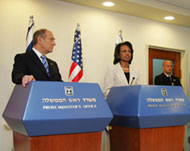Israel ‘to control security zone’
Israel has said it plans to enforce a “security zone” in southern Lebanon until an international force can be sent to take it over.

“We have no other option … We will have to build a new security strip, a security strip that will be a cover for our forces until international forces arrive,” Amir Peretz, the Israeli defence minister, said on Tuesday.
Peretz said Israel would maintain control of the security zone by firing at anyone who enters it.
Israeli government sources estimated a zone 3km to 4km in width. Western diplomats briefed by Israel said it could be as wide as 5km to 10km in some places.
Government officials said Israel would keep up its offensive until a proposed peacekeeping force begins deploying along the southern border and at crossing points between Lebanon and Syria to prevent Hezbollah from rearming.
“There cannot be an interim,” an Israeli government official said. “It would be a free time for Hezbollah to return to the border.”
Stabilisation force
Israel believes that a military stabilisation force of up to 20,000 troops would be needed and that it could be deployed up to two weeks after its approved, Israeli government officials said.
Western diplomats and analysts say any international force would include infantry, armoured units and special forces trained in handling crisis situations.
 |
|
Rice will attend the meeting in |
Several European Union nations have already said they would be prepared to contribute to a “buffer zone” force.
Israel wants the proposed force to secure the Lebanese side of the Israeli border with the help the Lebanese army and push Hezbollah 20km from the border to prevent rockets being fired into northern Israel.
Troops patrolled such a security zone during Israel’s 18-year military presence in Lebanon to prevent Hezbollah attacks.
Israel’s unilateral pullout from Lebanon in 2000 was prompted, in large part, by growing public discontent over the steady Israeli casualty toll in south Lebanon.
Rome conference
The international peacekeeping force will be on the agenda when European and Arab officials meet in Rome on Wednesday to discuss the conflict in Lebanon.
European Union officials have said they will push for a ceasefire followed by the deployment of troops that would help disarm Hezbollah.
Officials said that Javier Solana, the EU foreign and security affairs chief, will propose the establishment of a rapid-reaction force ideally built around French, German and Spanish troops, with forces from Turkey, the Netherlands, Canada and Arab states such as Egypt and Saudi Arabia.
Ehud Olmert, the Israeli prime minister, said earlier on Tuesday there would be no stopping in the two-week-old offensive in Lebanon and that “severe measures” would be taken against Hezbollah.
Condoleezza Rice, the US secretary of state, said during a visit to Israel that a ceasefire was needed, but not at any price.
Rice also told Lebanese leaders that Hezbollah must return two captured Israeli soldiers and withdraw from Israel’s border before there could be a ceasefire, Lebanese politicians said.
At least 70 rockets hit Israel on Tuesday, killing one Arab-Israeli girl and wounding at least 23 other people.